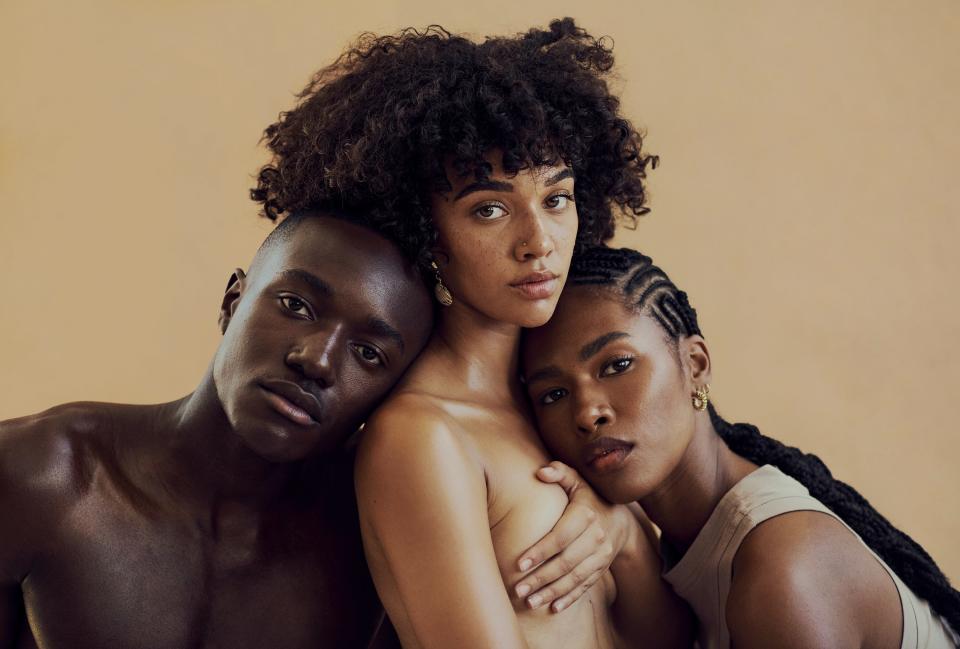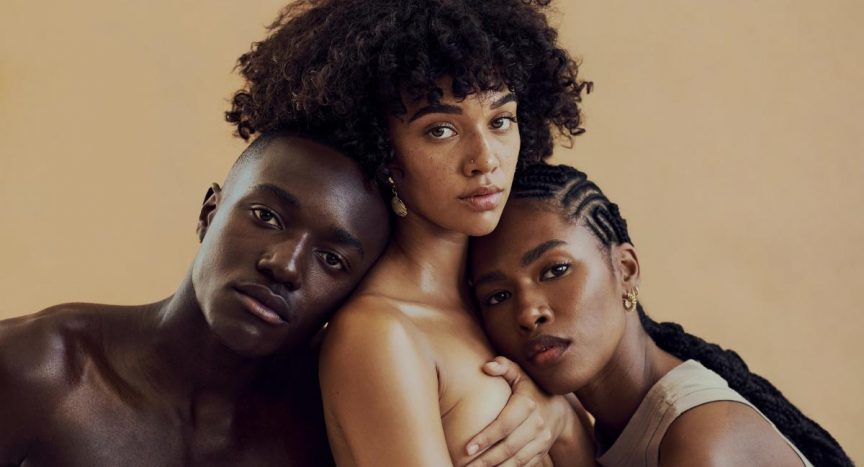
Getty Images
So, you want longer hair and you’ve stumbled upon an internet hack that claims to help you do that. Yep, we’re talking about castor oil for hair growth. Many have cited the ingredient as the reason for their longer, thicker hair, but with little science or proof to back up their claims. So, we figured it was time to ask the experts — dermatologists and a cosmetic chemist — to weigh in.
First things first: If you’re struggling with hair loss or thinning, you’re far from alone. It’s extremely common, impacting an estimated 80 million Americans. It can occur for several reasons, including hormonal changes, alopecia, and stress, so it’s always best to visit your doctor to determine what’s going on before diving into any possible treatments.
Regardless of the reason, losing hair can be stressful, and we get the temptation of trying at-home remedies like castor oil. (Those before-and-after photos are so dramatic, whether they’re real or not). To get a real definitive answer on this popular hair growth method, we turned to the pros.
Meet the experts:
-
Marisa Garshick, MD, is a board-certified dermatologist in New York City.
-
Ife J. Rodney, MD, is a board-certified dermatologist and founding director of Eternal Dermatology in Fulton, Maryland.
-
Perry Romanowski, a cosmetic chemist and the author of Beginning Cosmetic Chemistry.
-
Adam Friedman, MD, is a board-certified dermatologist and program director at The George Washington University School of Medicine & Health Sciences in Washington, D.C.
In this story:
What is castor oil?
Castor oil is derived from castor beans and is rich in protein, antioxidants, nutrients, and fatty acids, explains New York City-based board-certified dermatologist Marisa Garshick, MD. Like many hair oils, castor oil has been used for centuries all thanks to its “active ingredient ricinoleic acid, a hydrating and lubricating fatty acid,” adds Ife J. Rodney, MD, a board-certified dermatologist in Fulton, Maryland.
What is cold-pressed castor oil?
Not all castor oil is created equal. The castor oil you see in your hair-care aisle is typically cold-pressed — produced mechanically through a “physical crushing of the beans to extract a lighter, cleaner, and thinner form of oil that is abundant in nutrients and vitamins,” Dr. Garshick explains.
Castor oil that is not cold-pressed is typically used as a food preservative or in vegetable oils. It’s extracted chemically, via a “high-temperature roasting of the castor beans or a refining that involves bleaching and filtering,” says Dr. Garshick. “While this process helps to remove impurities, it can also impact the moisturizing and antioxidant properties of castor oil.”
What are the benefits of using castor oil?
Though it’s often touted as an all-natural panacea for your hair troubles (go ahead, Google it: You’ll find article after article about how this viscous oil can help with a myriad of issues like shedding, breakage, and regrowth) that probably isn’t the case. Unlike other popular oils and vitamins like rosemary oil and vitamin B5, both of which have at least some studies that back up their aid in hair growth, Dr. Garshick says scientific evidence surrounding castor oil’s ability to reverse hair loss is lacking. That being said, there are lots of other benefits to castor oil, making it a worthwhile ingredient for the hair.
-
It’s a natural emollient. Since castor oil is rich in ricinoleic acid, you can expect it to moisturize and seal natural oils into the hair, says Dr. Garshick. “It can nourish the hair, leaving it feeling and looking stronger and healthier,” she adds.
-
It’s an anti-inflammatory. Dr. Rodney says castor oil can help soothe an irritated, flaking scalp. Although this in itself doesn’t cause hair growth, it does create a healthy canvas for other hair growth treatments, as inflammation is thought to inhibit hair growth in certain cases.
-
It’s an antifungal and antimicrobial. Dr. Garshick explains this helps reduce dryness and itching and improves overall scalp health.
So, can castor oil help grow hair?
The TL;DR is no. “Castor oil will not grow hair,” says Perry Romanowski, a cosmetic chemist and the author of Beginning Cosmetic Chemistry. “There is no evidence for it and no scientific theory supporting that it would work. So yes, it’s a total myth.”
Dr. Garshick echoes this, explaining all that’s known about castor oil for hair growth is that its ricinoleic acid content may boost circulation in the scalp, and subsequently promote healthier and stronger hair — but this is all speculative. “However, anecdotally, people have noticed improvement,” she says.
“While it does have antimicrobial properties that may be useful in terms of fighting off bacterial or fungal overgrowth on the scalp that can lead to hair-damaging inflammation, there is zero evidence [showing] it is helpful for hair growth,” adds Adam Friedman, MD, a board-certified dermatologist and program director at The George Washington University School of Medicine & Health Sciences.
Despite it not being a reliable hair growth treatment, castor oil can be a worthwhile ingredient for scalp and hair health. With all of its proven benefits, “castor oil may promote a healthy environment for hair regrowth,” Dr. Garshick adds.
Risks and limitations of using castor oil
When using castor oil, “some people may experience an allergic reaction or skin irritation,” says Dr. Rodney. For this reason, experts recommend a patch test before applying castor oil to the hair or scalp. Castor oil may also worsen scalp conditions like seborrheic dermatitis (a form of eczema on the scalp), Dr. Garshick warns.
Finally, castor oil can clog pores and may stay in the hair longer than intended due to its dense nature. “Overuse and improper hair washing may also lead to a castor oil build-up, contributing to irritation and breakouts,” says Dr. Garshick. So if you are using it regularly, avoid your face and shampoo thoroughly.
What can you do to help hair grow?
Despite evidence being lacking when it comes to castor oil, there are plenty of other things you can do to help your hair grow and reduce thinning.
Talk to your dermatologist.
“It’s always important to see a board-certified dermatologist to evaluate the cause of hair loss and discuss additional treatment options,” says Dr. Garshick. “Because hair loss can be multifactorial, it is important to understand what the specific cause of the hair loss is to best treat and manage it.”
Change hair-damaging habits.
This can look like limiting your use of hot tools, skipping your hair coloring treatment, and opting for looser hairstyles. (Yes, your low bun can be contributing to your fall-out.)
Turn to other topical treatments.
Similarly to castor oil, the consensus on rosemary oil is unclear, but the evidence is promising. Other treatments like minoxidil (Rogaine) are proven with studies, glowing reviews, and success stories to boot. However, treatments like minoxidil require ongoing effort and upkeep with application, which must be considered.
In-office procedures.
Dr. Garshick recommends platelet-rich plasma (PRP) therapy as a helpful tool in “promoting hair growth and improving hair density.” Other treatments include laser therapy, microneedling, injectables, and even hair replacement treatments.
Reduce stress.
“Just try to relax” is generally a useless recommendation, but stress is actually one of the main causes of telogen effluvium, a temporary type of hair loss. Stress and traumatic events can make your hair enter its shedding phase early, causing hair loss and thinning. Although we can’t control stressful and traumatic events in our lives, knowing that this is a common cause of hair loss can be useful context when turning to help or researching treatments.
More on hair loss:
Now, watch a full wash day routine:
Follow Kaleigh on Instagram and Twitter, or subscribe to Allure’s newsletter for daily beauty stories delivered right to your inbox.
Originally Appeared on Allure



